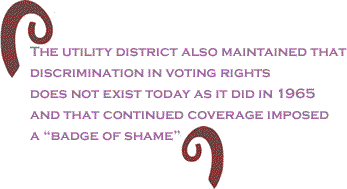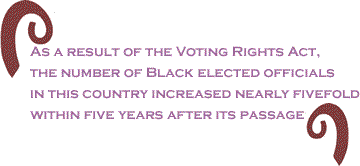
|
||||||||||||||||||||||
 |
||||||||||||||||||||||
 |
||||||||||||||||||||||
 |
||||||||||||||||||||||
 |
||||||||||||||||||||||
 |
||||||||||||||||||||||
 |
| The current issue is always free to everyone |
|
|
 |
The long march toward political
equality for Blacks and other people of color recorded an important
victory May 30, 2008 when a three-judge federal court in The Voting Rights Act of
1965, the crown jewel of American democracy, is the most effective
tool for protecting minority voters against persistent and constantly
shifting techniques that impede minority voting strength. Section
5 of the Voting Rights Act covers the entire state of The case decided last week,
Northwest Austin Municipal Utility District Number One v.
Mukasey, was filed by a small utility district in The utility district argued
that it was entitled to “bailout” or seek exemption from coverage
under Section 5 and that Congress did not have the power to
enact the extension. The Court rejected both arguments, holding that the utility district was not eligible for a bailout because that opportunity is limited to jurisdictions that conduct voter registration, which the utility district does not do. In rejecting the utility district’s second argument, the Court disagreed with the contention that racial discrimination in voting does not persist in the modern day. “This case implicates Congress’s express constitutional authority to remedy racial discrimination in voting” under the Fifteenth Amendment, the Court maintained, and “given the extensive legislative record documenting contemporary racial discrimination in voting in covered jurisdictions, Congress’s decision to extend Section 5 for another twenty-five years was constitutional.” As the Court recognized, the record in the case, which spans more than 16,000 pages, documents the essential role that the VRA plays in pursuing political equality for minorities.
More broadly, as a result
of the VRA, the number of Black elected officials in this country
increased nearly fivefold within five years after its passage.
Today, there are over 9,000 Black elected officials, 43 of whom
serve in Congress. Most of these officials are elected from
districts created or protected under the VRA where minorities
form a majority of the voters. Moreover, as a sign of continuing
progress, the sole Black member of the US Senate made history
this week by becoming the first Black Democratic Nominee for
the President of the These are accomplishments of which we as a nation can be proud.
In addition, jurisdictions
will likely continue to resort to increasingly sophisticated
tools and devices to restrict the rights of minority voters
including the adoption of restrictive government-identification
requirements, intimidation, deceptive practices, purging of
voter rolls, and aggressive challenges inside the polls on Election
Day. We owe it those whose human sacrifice led to the passage of the VRA and to the future of American democracy to continue the march toward the fulfillment and protection of the VRA, both in the courts and in our communities. BlackCommentator.com Guest Commentator, Ryan Paul Haygood, is a resident of Newark's South Ward and a civil rights attorney in New York City and an Assistant Counsel at the NAACP Legal Defense and Educational Fund, Inc. (LDF). As Co-Director of the NAACP Legal Defense Fund’s (LDF) Political Participation Group, he, along with a team of the nation’s leading civil rights organizations and a leading Washington law firm, defended the Voting Rights Act of 1965 before three federal judges in the Nation's Capitol. Click here to contact Mr. Haygood. |
Any BlackCommentator.com article may be re-printed so long as it is re-printed in its entirety and full credit given to the author and www.BlackCommentator.com. If the re-print is on the Internet we additionally request a link back to the original piece on our Website. Your comments are always welcome. eMail
re-print notice
If you send us an eMail message we may publish all or part of it, unless you tell us it is not for publication. You may also request that we withhold your name. Thank you very much for your readership. |
|
| June
26, 2008 Issue 283 |
|
| Executive Editor: Bill Fletcher, Jr. |
| Managing
Editor: |
| Publisher: Peter Gamble |
| Est. April 5, 2002 |
| Printer Friendly Version in resizeable plain text format or pdf format. |
 |
 |
 |
| |
| |























 The
record contains numerous examples of Section 5’s role in barring
and deterring voting changes that would have been harmful to
minorities. For example, since the VRA’s passage, every plan
initially submitted by
The
record contains numerous examples of Section 5’s role in barring
and deterring voting changes that would have been harmful to
minorities. For example, since the VRA’s passage, every plan
initially submitted by  What
remains to be done, however, is as daunting as the advances
in the march toward political equality have been great. As we
celebrate the Court’s important ruling here, which likely will
be appealed to the Supreme Court, a continued threat to roll
back the accomplishments of the VRA stands before us. To be
sure, other challenges like those launched by the utility district
in
What
remains to be done, however, is as daunting as the advances
in the march toward political equality have been great. As we
celebrate the Court’s important ruling here, which likely will
be appealed to the Supreme Court, a continued threat to roll
back the accomplishments of the VRA stands before us. To be
sure, other challenges like those launched by the utility district
in 








